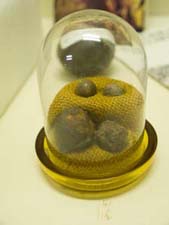This war was also known by such names as "The Second War of Independence" and "Madison's War." The war was fought from June of 1812 until the peace treaty was ratified and accepted by President Madison on February 17, 1815.
It was during the American defense of Fort McHenry in Baltimore, that Francis Scott Key is said to have penned the poem that would ultimately end up being the lyrics to "The Star Spangled Banner," our national anthem. Another excellent site about the "Star Spangled Banner" can be found at this link.
A battle of note from our area was the Battle of Plattsburgh, also known in some circles as the Battle of Lake Champlain, was considered the turning point in the War of 1812. A relatively small force of approximately 5,000 Americans, including 2,200 Vermont militiamen, defeated a formidable force of roughly 11,000 British sailors on Sept. 11, 1814. This battle ended the British Invasion from Canada.
Presented here are a few articles that we have been able to collect from various sources over the years.

An U.S. Springfield Model 1795 manufactured in 1811 and used during the War of 1812

A ca. 1795 bayonet that would have been used on the U.S. Springfield musket.

On the bottom we have a selection of grapeshot used during the War of 1812, recovered from Lake Champlain.